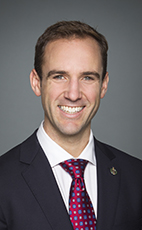Mr. Speaker, I rise to speak to Bill S-240, which is private member's business relating to trafficking in human organs.
To begin, let me clearly state that our government is entirely committed to ensuring that our criminal justice system keeps communities safe, protects victims and holds offenders to account.
Additionally, our government has a proven record over the last three plus years of presenting a solid face on the international stage as it relates to trafficking in organs, to trafficking in people and to the illicit trafficking of arms exports.
Members in this House will recall that, not too long ago, under the leadership of our foreign affairs minister, our government introduced Bill C-47, which would allow Canada to accede to the Arms Trade Treaty, to ensure that arms sold to other state entities were not going places where they could contravene international law, where they could cause all kinds of horrific things to occur. Quite frankly, we introduced that bill and we believe in the philosophy that underlies it because we understand the importance of global human rights and the equality of human dignity and ensuring that international law is upheld. We certainly share that philosophy when it comes to any and all other matters that concern trafficking and activities that occur across borders in illicit ways. That would relate as well to the trafficking of human organs.
We want to eliminate human organ trafficking around the world. That is why Canada's criminal justice system is at the forefront of these efforts. We want to stop these kinds of activities from happening abroad.
Furthermore, we certainly condemn the illegal and exploitative trade of human organs in the strongest terms, and we say that both in Canada and on the international stage. People can be sure that the officials who represent Canada at embassies and in international forums abroad share that same message, as would all members on the government side of the floor, when meeting with constituents in their home ridings, representing the government from coast to coast to coast and when travelling abroad to represent the Government of Canada and all Canadians on the international stage.
Organ transplantation and donation is governed by a comprehensive legislative framework at federal, provincial and territorial levels in encompassing health and criminal law. We are talking about significant coordination between different federal departments and agencies, which all have to work together to ensure we can guard against the trafficking of human organs. It takes cross-jurisdictional conversations as well to ensure officials at provincial and territorial levels, as well as public safety officials, ensure these sorts of things can be snuffed out and guarded against, and that this sort of trafficking is prevented as much as possible. Trafficking is prevented in drugs and human smuggling at home or when things arrive at our borders or shores.
We want to ensure we take a public health approach when we look at these sorts of things as well to ensure, first and foremost, that we look after the safety, security, health and well-being of Canadians. When we do that at home, we have the ability to share that story around the world and work with other partners on the international scene who may not have the same level of capacity Canada has to deal with these issues. It is a lesson and something we share across the world. Where we have the capacity to step up and lead, Canada always has. It has certainly been the story under this government.
We have to be aware of trafficking in human organs and other illicit goods, especially in the context of increased migration and flows of people who are on the move more so than we have seen since the end of World War II. In many cases, people are fleeing persecution. In some cases, they are fleeing gang violence and other activities that have caused them personal, physical, mental and psychological harm. Therefore, it is important we understand why people are on the move, what other illicit activities could be camouflaged with people moving around and how we guard against any trafficking at all, but certainly a proliferation of trafficking of things like human organs, persons or other illicit goods.
Another point is that the Criminal Code in Canada currently prohibits the removal of an organ without the informed consent of the donor. If we lacked that provision in our Criminal Code, think how terrible it would be to have an organ removed without one's consent. We have taken steps in our country to ensure that is not the case. It is reflected in our view that human dignity is to be upheld in all cases. Having someone's consent to have an organ removed is upheld in Canada.
With the few minutes I have left, it might be worth re-emphasizing for those who have been watching over the last few minutes how seriously we take the issue of trafficking in human organs, just like we take all matters that would have a negative or deleterious effect on the health, well-being, safety and security of Canadians or on the Canadian population.

